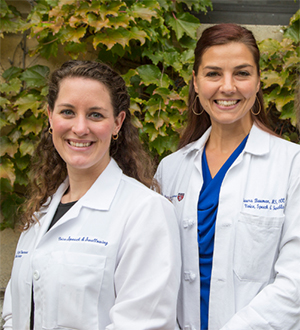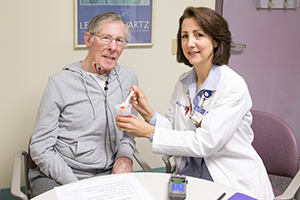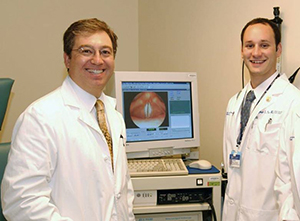Conditions We Treat
Voice, Speech and Swallowing Conditions
 Our speech-language pathologists are experienced in treating a variety of
voice, swallowing and upper airway disorders. In addition to evaluating,
counseling and treating, we also work closely with your physician to
provide coordinated care. And, we offer pre-surgical counseling when
needed.
Our speech-language pathologists are experienced in treating a variety of
voice, swallowing and upper airway disorders. In addition to evaluating,
counseling and treating, we also work closely with your physician to
provide coordinated care. And, we offer pre-surgical counseling when
needed.
Therapy sessions are based on your unique needs, and we our facility also has access to a state-of-the-art technology, such as our Computerized Speech Lab.

Voice disorders can be caused by excessive singing, talking, smoking or coughing and can affect your ability to speak. Our voice specialists diagnose and treat a wide range of voice disorders using our state-of-the-art Computerized Speech Lab as well as regular therapy sessions based on your individual needs. Pre-surgical counseling is provided when appropriate.
Types of Voice Disorders
You may have a voice disorder if you have one or more of the following symptoms: hoarse, raspy or gravelly voice quality; straining to speak; voice breaks and/or periods of not being able to speak; vocal fatigue; vocal tremulousness; persistent throat irritation, throat pain and/or pain when speaking.
Common Types of Voice Disorders
- Vocal Hyperfunction/Muscle Tension Dysphonia
- Laryngo-pharyngeal Reflux
- Vocal Nodules and Polyps
- Granuloma
- Vocal Fold Paralysis
- Vocal Fold Cysts
- Spasmodic Dysphonia
- Vocal Fold Hemorrhage
Voice Therapy
After your initial visit with your ENT, you may be referred to our clinic for evaluation and treatment. Following is what you can expect for a typical course of treatment
- First diagnostic visit: A speech pathologist will use a diagnostic tool called laryngovideostroboscopy to examine your vocal folds in slow motion.
- Second diagnostic visit: A speech pathologist will collect acoustic measurements of your voice and have you participate in trial voice therapy techniques.
- Voice Therapy. If you need surgery, this may occur either before therapy, or after a few initial sessions
- You will have a final voice re-assessment.
- You will have a post-therapy Strobe, a non-invasive procedure to examine your vocal fold vibration and vocal fold closure (if necessary, per MD).
Voice therapy is much like physical therapy for any other part of the body. Sessions usually take place weekly for about 8 visits. You'll learn about the basic anatomy and physiology of the voice mechanism and about how to care for your voice. Pre-surgical counseling is provided when appropriate.
To achieve the best results, we'll provide exercises to be completed at home. We will do our best to help you figure out how to fit these practice exercises into your daily schedule.
Through practice, the body learns to make the small changes required for effective voice activation and for a smoother, easier voice. Regular practice helps to make these changes automatic so that eventually they come naturally. You may find it helpful to record your voice therapy visit using you smart phone or other recording device to aid with home practice.
Voice Care Services and Treatment
Lee Silverman Voice Treatment®
Lee Silverman Voice Treatment ® (LSVT) is a specific therapy protocol designed for individuals experiencing difficulty communicating due to Parkinson's Disease and other types of neurological disorders that affect speech. This treatment involves a very intense treatment schedule over a short period of time. It focuses on using increasing vocal volume (loudness) to improve your voice.
Care of the Professional Voice
Performers (such as singers, actors and broadcasters) and other professional voice users (such as teachers, clergy, and salespeople), rely on optimal function of their voices for their livelihoods. Appropriate care of the professional voice requires experience and training beyond basic voice diagnosis and therapy techniques. Our voice team has the specialized knowledge required to optimize and maintain voice quality.
Transgender Voice
Individuals may want to modify their voice and communication to better align with their gender identity. We work with adolescents and adults across the gender spectrum who are seeking training. All of our services begin with a full, comprehensive evaluation, to assess the health and function of the larynx (voice box) and to determine specific communication needs. Our therapists offer a caring and supportive approach and address areas such as resonance, pitch, and intonation. We offer an individualized program in a private setting. Small groups may be offered to allow practice opportunities with people who have similar therapy goals.
Manual Voice Therapy
Voice disorders can be either caused by, or may lead to, muscle tension in the throat and upper body. Release can occur through techniques such as massage and myofascial release. These techniques can provide relief from throat discomfort, tightness and a sensation that something is "stuck" in the throat. Sometimes we may also teach you ways to massage your own neck and throat muscles to further improve relaxation and voice function.
Pre- and Post- Laryngectomy Evaluation
Diseases such as cancer of the larynx (voice box) may require surgical removal of the vocal cords (laryngectomy). If you're recovering from this type of surgery, the speech-language pathologists at BIDMC will work closely with you and your doctor to help. We are here to provide the education, training and support to help you adjust to new ways of speaking and to communicate effectively. Services include:Comprehensive pre-operative counseling.
Patients are shown and explained the various options for speech and communication following surgery.
Patient-to-Patient Support
Meet other patients who have had laryngectomy surgery and have learned to communicate successfully.
Support Groups
We provide information and opportunities to get involved in a local laryngectomy support group.
Artificial Larynx Training
A loaner artificial larynx, as well as instruction in how to communicate with it, is provided following surgery. We are experts in knowing how to select and purchase an artificial larynx.
Esophageal Speech Training
Upon completion of radiation therapy, we are available to teach esophageal speech, as well as help patients decide whether or not to have a tracheoesophageal puncture prosthesis placed.
Tracheoesophageal Voice Prosthesis
Our speech-language pathologists have specialty training in teaching patients how to place, care for and clean a voice prosthesis following a tracheoesophageal puncture procedure. We are also available to change voice prostheses when needed.
 If you have a swallowing disorder you might feel pain or discomfort when you eat or drink. This type of condition can make it difficult to get all the calories, fluids and nourishment your body needs. Our expert team evaluates, counsels and treats all swallowing disorders, including those caused by a stroke, ALS, Parkinson's disease, brain tumors, surgery, or radiation therapy to the neck.
If you have a swallowing disorder you might feel pain or discomfort when you eat or drink. This type of condition can make it difficult to get all the calories, fluids and nourishment your body needs. Our expert team evaluates, counsels and treats all swallowing disorders, including those caused by a stroke, ALS, Parkinson's disease, brain tumors, surgery, or radiation therapy to the neck.

Upper airway disorders can cause painful inflammation that makes it difficult to breath. These types of disorders can sometimes be confused for asthma.
More About Upper Airway Disorders
